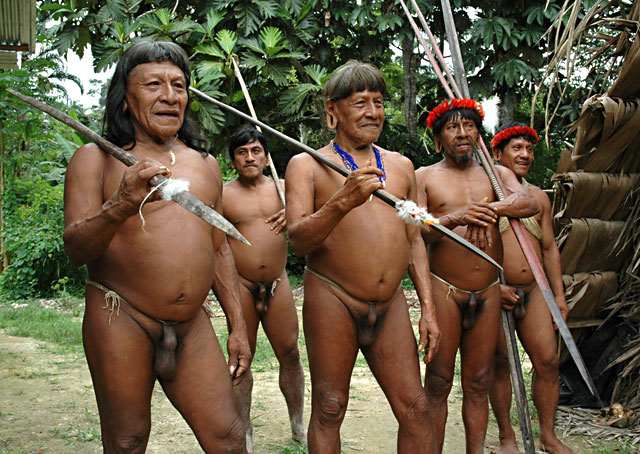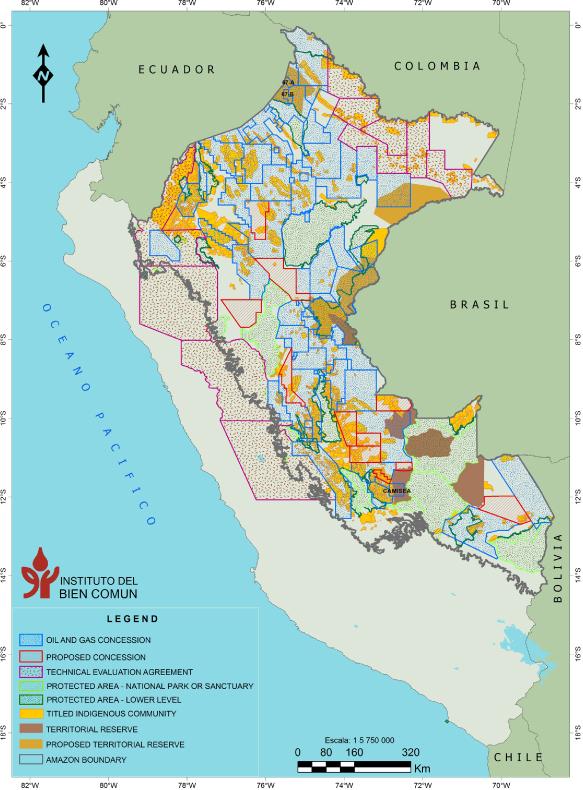Anglo-French Oil Company Perenco Plans Amazon Invasion
posted on June 3rd, 2010 in Amazon Jungle, Environment, Indigenous Rights, Peru
A group of Waorani Indians in Ecuador with blow pipes
( Note: At a time when oil is gushing unchecked into the Gulf of Mexico, despoiling one of the richest ecosystems in the Americas, another oil company, Perenco, moves closer to building an oil pipeline through one of the remotest areas of the Amazon, in northern Peru, with the risk of oil workers making a potentially deadly contact with one or more uncontacted Amazonian tribes. Oil workers and illegal loggers have been invading indigenous territories–with often deadly consequences for native peoples–for the last one hundred years–Kim MacQuarrie)
‘Scare the uncontacted tribes or tell them to go home,’ advises Perenco
Survival International
May 11, 2010
Oil company Perenco has released a plan revealing how its workers would react if they meet any uncontacted Indians.
Perenco, chaired by one of France’s wealthiest men, is hoping to build a pipeline into one of the remotest parts of the Peruvian Amazon.
The plan outlines potential scenarios and describes how its workers would react if contact is made:
• ‘Our workers will speak in loud voices, in a peaceful way, in order to establish friendly communication (with the uncontacted tribes).’
• ‘They would use gestures, or draw on the ground, or use other methods to make themselves understood.’
• ‘It is important to persuade them to return to their settlements.’
• ‘If attacked, the native guides will use flare-guns or smoke canisters, firing into the air in order to scare and repel them.’
The area where Perenco is working is one of the most biodiverse regions in South America and home to at least two of the world’s last uncontacted tribes. Perenco denies the tribes exist, but it has been requested to prepare a plan in case of contact by Peru’s Energy Ministry. The Ministry has sent the plan to the government’s indigenous affairs department, INDEPA, for its consideration.
Perenco’s plan was made public on the Energy Ministry’s website. The pipeline it hopes to build is expected to be 207 kms long and affect the rainforest for 500 metres on either side.
The aim of the pipeline is to help transport huge oil deposits, declared commercially viable several years ago, from the remote Amazon to Peru’s Pacific Coast. Spanish-Argentine oil giant Repsol-YPF and ConocoPhillips are currently hoping to explore for oil in the same region.
Survival director, Stephen Corry, said today, ‘It’s difficult to know what’s more disturbing about Perenco’s plan: the fact that it still claims the uncontacted tribes don’t exist, or its extraordinary admission its workers will deliberately scare the tribes or tell them to go home. The Indians simply want to be left alone, and have that right.’
Background briefing on Perenco – Oil company
Perenco is a Anglo-French company which has a huge oil project in Peru’s northern Amazon.
This is an area inhabited by at least two vulnerable uncontacted tribes who may well be destroyed by Perenco’s work there.
One of the groups is believed to be a sub-group of the Waorani and another is known as the Pananujuri.
No one is sure how many of them there are.
‘Miracle’
It is not difficult to see why Perenco wants to work in this region. The discovery of oil there is believed to be the biggest in Peru in 30 years – an estimated 300 million barrels.
During a personal visit to one of the wells, Peru’s president, Alan Garcia, declared the discovery a ‘miracle.’
‘We’re people just like you’
Barrett Resources, the company acquired by Perenco last year, recommended that its workers shout a number of messages if they came across any uncontacted Indians.
These included, ‘We’re people just like you’, ‘We haven’t come here to look for women, we have our own women in our own village’ and ‘Is something disturbing you?’
Perenco claims the area is uninhabited, but the Peruvian government, the Ecuadorian government, local indigenous organizations and countless experts have all recognised the presence of isolated Indians in the area.


